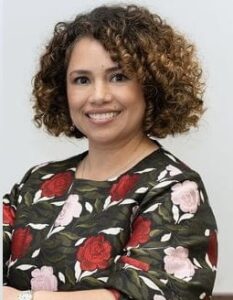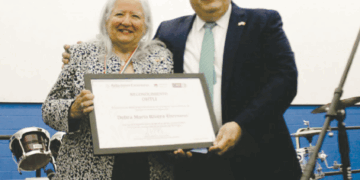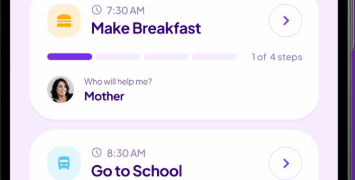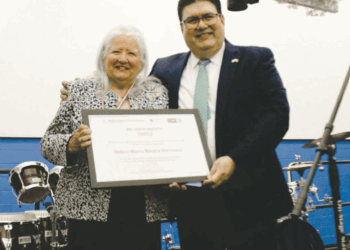By Dr. Aura J. Cazares Editor’s Note: With this issue we welcome a new contributing columnist, Dr. Aura Cazares, Assistant Dean of Students at Oakland University. Dr. Cazarez will share her advice for students and their families based on her own personal experiences and her career of more than two decades working with students in a variety of academic institutions.
The inspiration behind this column’s name is a saying I use when I meet with students lately, “you already have a no, get after the yes.” In a few weeks, many families will experience their first family member leaving to attend college or someone resuming their post-high school academic goals. So, how do we support our students when the system is different than what we know or if no one in our families has attended college/university before?

According to the U.S. Census and the organization Excelencia in Educatión, six percent of Michigan’s population is Latino. Latino students make up nine percent of K-12 students and 22% percent of college students in Michigan. While all students face challenges to complete their degrees, Latinos enrolled in community colleges graduate at a 21% rate and 54% of students enrolled in a four-year institution complete their degree. In my role of Assistant Dean of Students at Oakland University, I have supported hundreds of students who are first-generation students enrolled in college and have witnessed their common challenges. In all honesty, my biggest connection to students is my lived experiences as a first-generation, immigrant student a few decades ago and my testimony that considering the support tips below will increase their ability to succeed and reach their academic goals.
Go for Yes!
Start on the right foot: Reading all the messages sent by all institutions is critical since they have deadlines that determine funding opportunities, and next steps about their situation. Communications in the month of August are important since the financial aid office will share payment plans and scholarships, the admissions office will share orientation dates, and the academic advisors on how to choose their classes. Create a flag or reminder for departments so that messages from these offices are not missed.
Nobody is born knowing everything: For many students, being the first student to attend college in their family turns into overwhelming pressure to succeed and know what they are doing. This pressure prevents them from recognizing they need help or asking for help. It is important to reinforce that there are offices with support services such as academic advisors, the Dean of Students office, and counseling centers.
Time is of the essence: Some students have additional obligations such as familial responsibilities that compete for their time and attention when they have to work on homework or projects. Other students have not been taught how to prioritize their time and additional obligations. In order to manage their time, the key is to add the hours of instruction they are enrolled and set aside one hour for each hour of instruction. This time management strategy will provide students an idea of how much time they need to assign to their studies so they can plan for additional responsibilities.
Over the next weeks I will continue sharing tips and keys to academic success that are within our grasp. I suggest that you share these tips with all the students in your life and remind them that the key to a successful academic year is to ask for help, remember there are departments who provide support, they are not alone in their journey, and we are proud of them.

Dr. Aura J. Cazares has over two decades of experience employing Spanish fluency and analytical skills to lead strategic enrollment and student support systems for a Catholic Jesuit University and a Hispanic Serving Institution, an urban community college, and currently leads support systems for students and diversity, equity, and inclusion initiatives at a four-year institution. Her interest and passion are addressing systemic barriers that preclude student success and educating her community about how to achieve academic and professional success. She loves spending time with her family and friends, watching movies, and listening to audiobooks.
A Tu Alcance
Consejos para Lograr Nuestras Metas Universitarias
La inspiración del título de esta sección es el dicho que recientemente uso con mis estudiantes, “el no ya lo tienes, arriésgate por el sí.” En unas semanas varias familias vivirán la experiencia de tener un miembro de sus familias empezando o continuando clases universitarias.Pero ¿cómo ayudamos a nuestros estudiantes cuando el sistema es tan diferente a nuestros países o si nadie en nuestra familia ha tomado ese paso?

Según las estadísticas reportadas por el censo de los Estados Unidos y la agencia Excelencia in Educación, el seis por ciento de la población de Michigan es Latina y el nueve porciento de los estudiantes de Michigan en grados Kínder- 12 tanto como el 22% de estudiantes universitarios de 18-34 años son Latinos. De los estudiantes matriculados en colegios comunitarios solo el 21% completan su programa y solo el 54% de estudiantes matriculados en universidades completan sus licenciaturas. Por lo cual mi meta como vicedecana de estudiantes es apoyar a cientos de estudiantes que son los primeros en cursar la universidad de sus familias. En sí, el lazo que me une a ellos es que yo estuve en su lugar hace más de dos décadas y sé que si consideran estos sistemas de apoyo incrementara sus posibilidades de completar sus metas postsecundarias.
¡Vamos por el Si!
Empezar con el pie derecho: leer todos los mensajes de las instituciones ya que tienen fechas límites y pasos a seguir sobre su caso. Agosto provee planes de pagos la oficina de ayuda financiera, fechas de orientación de la oficina de admisiones, y como seleccionar sus clases de sus asesores académicos. Lo ideal es crear un recordatorio o señal ligado a estos departamentos para que esos mensajes no pasen desapercibidos.
Nadie nace sabiendo todo: Para muchos estudiantes ser el primero en ira la universidad se convierte en presión de sobresalir, pero puede resultar en presión abrumadora que les impide pedir ayuda en cuanto la necesitan. Sistemas de apoyo proveído por oficinas como asesores académicos, decanos de estudiantes, y consejos están disponibles para brindarles apoyo.
Ganarle tiempo al tiempo: Algunos estudiantes tienen obligaciones familiares que compiten con sus tareas y proyectos escolares. A otros estudiantes no se les ha enseñado como dividir su tiempo y priorizar sus deberes. Para obtener el éxito académico la clave es primero calcular las horas de instrucción en el aula y después planear al mínimo una hora de estudio por cada hora de instrucción. Esto le dará una idea cuanto tiempo debe asignar a sus estudios.
Las próximas semanas continuare escribiendo sobre la clave del éxito académico y en otros ámbitos. Les pido que compartan estas recomendaciones con sus estudiantes y les recuerden que la clave para empezar el año escolar con éxito es recordar que hay áreas que brindan apoyo, no están solos, y el orgullo que sentimos por ellos.

La Dra. Aura J. Cazares tiene más de dos décadas empleando fluidez en español y habilidades analíticas para liderar la matriculación de estudiantes y sistemas de apoyo en una Universidad Católica Jesuita y una Institución designada institución de servicio hispano o HSI (por sus siglas en ingles), un colegio comunitario e iniciativas de diversidad, equidad e inclusión en una institución pública de cuatro años. Su interés y pasión son desmantelar sistemas que impiden el éxito de los estudiantes y educar a la comunidad sobre como alcanzar el éxito académico y profesional. Sus pasatiempos favoritos son pasar tiempo con su familia y amigos, ver películas, y escuchar audio libros.














































